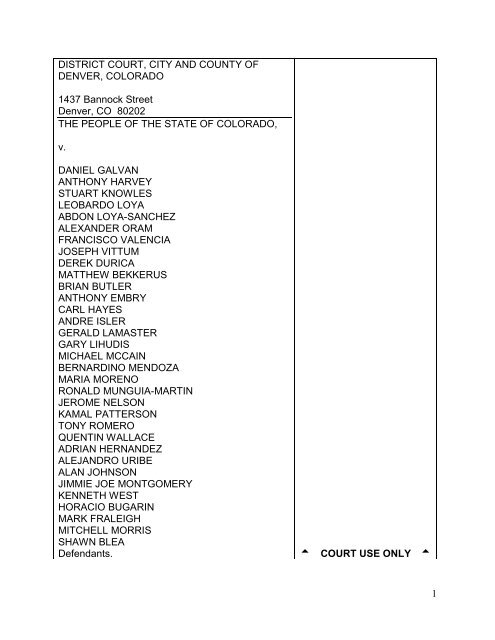If you wanted to sue somebody who rear-ended your cars and truck in downtown Denver, however you live in Lakewood and the other chauffeur lives in Aurora, where you can file the lawsuit will depend on what level of court you submit in. If you wished to submit in Jefferson County, the county where you live, you might have to file in a particular court level, while if you desired to submit where the other driver lives, you may have several alternatives regarding what court level you can submit in.
More particularly, the Colorado Guidelines of Procedure for Small Claims Court supplies that all actions brought in little claims court need to be brought in the county where the Offender lives, is frequently employed, has a workplace, or is a student at an organization of higher education. This jurisdictional area requirement might make it bothersome to submit in little claims court.
Denver County Court
In addition to financial and place limitations, filing in little claims court likewise restricts the ability of parties to the suit to be represented by attorneys. Since little claims courts are developed to allow easy and effective access to the court system for claims that might not have enough money at issue to justify employing an attorney, the Colorado Rules of Treatment for Small Claims Court only allows parties to be represented under certain conditions.
In contrast, the Accused might constantly select to be represented by an attorney but needs to notify the opposite before the trial date. If the Accused picks to be represented by an attorney, then the Complainant might also select to be represented by a lawyer. Colorado county courts have a $15,000 maximum jurisdictional requirement.
Furthermore, county courts have concurrent jurisdiction with little claims courts indicating that if an individual can file in small claims court, they can also file in county court. County courts in Colorado are recognized and governed by C.R.S. 13-6-101 to 13-6-504 while procedure is governed by the Colorado Rules of County Court Civil Procedure.
Denver District Court 1437 Bannock St, Denver, Co 80202
Accordingly, in county court parties can ask questions of the other party to get info for both their own case technique and to get information about the other party’s strategy. Furthermore, depositions and production of documents can be requested which will even more help in the preparation of one’s case. To this end, discovery is an useful and handy tool and reliable usage of it will help gather proof to prove your claims while assisting one to effectively refute the other party’s claims.
As discussed above, little claims actions can, normally speaking, only be submitted where the Accused lives, works, or belongs of business. County court, however, permits the lawsuit to be filed where the Defendant resides, where the Plaintiff resides if the Offender is served because county, and in the county where the occasion giving increase to the suit occurred.
The greatest level of civil trial courts in Colorado are the district courts. In addition, district courts have concurrent jurisdiction with small claims courts and county courts; therefore, if a lawsuit can be filed in small claims court or county court, it can also be submitted in district court.
Denver County Court Fines
13-5-101 to 13-5-145 and numerous of the districts consist of numerous counties. Litigation in district court is governed by the Colorado Guidelines of Civil Procedure. Comparable to the difference in between county court and small claims court, district court permits a more in-depth lawsuits process as compared to its lower level equivalent, county court.
 Colorado Judicial Branch – Bio
Colorado Judicial Branch – BioFurthermore, the guidelines governing treatment in district court are a lot more complex and the process is not designed to be streamlined; rather, district court is created to use parties the chance to completely examine and prosecute all of their claims given that, much of the time, significant quantities of cash remain in dispute.
Denver, along with many Colorado counties, has actually seen a considerable boost in COVID-19 activity in recent weeks. DENVER The Second Judicial District, which incorporates Denver, will not be carrying out any more jury trials for the rest of the year, according to an administrative order from Chief Judge Michael A. Martinez.
Find My Courtroom Or Case – Denver Da
There are presently no counties at that level. In March, the order says, Chief Justice Coats of the Colorado Supreme Court provided an order customizing court operations in response to issues related to the COVID-19 pandemic.
In April, the state Supreme Court issued an administrative order finding that jurors would not be assembled in the 2nd Judicial District “amidst the extraordinary situations and growing public health issues related to COVID-19,” the order says. It adds that the decision was made that jury pools could not be put together in a method that complied with existing public health standards.
 DISTRICT COURT, DENVER COUNTY, COLORADO 1437 Bannock Street Denver, CO 80202 720-865-8301
DISTRICT COURT, DENVER COUNTY, COLORADO 1437 Bannock Street Denver, CO 80202 720-865-8301 Denver County Court – Posts Facebook
Denver County Court – Posts Facebook3, subject to a waiver from the Chief Justice. The order says throughout the suspension of jury calls, the Second Judicial District participated in substantial planning efforts to dramatically customize the format and process by which jurors are summoned and put together to ensure it might be done safely and in compliance with public health guidelines.
District Court, City And County Of Denver
Masks are back in Denver’s courtrooms. Second Judicial District Chief Judge Michael Martinez on Sunday bought anyone participating in court, carrying out business in court structures or going into probation offices to use masks up until further notification. The brand-new rule, which starts Monday, was triggered by the surging delta variant of the coronavirus, along with the Centers for Disease Control and Avoidance’s recommendation last week that both immunized and unvaccinated individuals use masks in public indoor settings in places where the virus is spreading out at a significant or high rate, Martinez composed in his order.
The addition of masks is intended to “offer extra safety,” he composed. The order applies to Denver district, county, probate and juvenile courts, and likewise was signed by those courts’ administering judges. People who are affirming in court, interpreting or those who can not “clinically endure” a face covering are exempted from the order.
Today is a holiday! Business hours may be different today.
1 District Court, City And County Of Denver
Appropriately, in county court parties can ask concerns of the other party to gain details for both their own case strategy and to acquire details about the other party’s method. In addition, depositions and production of documents can be asked for which will even more assist in the preparation of one’s case. To this end, discovery is a beneficial and practical tool and efficient usage of it will help gather evidence to prove your claims while helping one to successfully argue against the other party’s claims.
As talked about above, little claims actions can, typically speaking, only be filed where the Offender lives, works, or belongs of business. County court, nevertheless, allows for the claim to be filed where the Accused resides, where the Plaintiff resides if the Defendant is served in that county, and in the county where the occasion providing increase to the claim occurred.
The highest level of civil trial courts in Colorado are the district courts. Additionally, district courts have concurrent jurisdiction with little claims courts and county courts; thus, if a claim can be submitted in little claims court or county court, it can likewise be submitted in district court.
Prosecutor Who Resigned From Denver Da Office In Controversy
13-5-101 to 13-5-145 and several of the districts include several counties. Lawsuits in district court is governed by the Colorado Guidelines of Civil Treatment. Similar to the difference in between county court and small claims court, district court permits a more in-depth litigation process as compared to its lower level equivalent, county court.
Furthermore, the guidelines governing treatment in district court are much more intricate and the process is not designed to be streamlined; rather, district court is created to use parties the opportunity to fully investigate and litigate all of their claims since, much of the time, significant quantities of money are in dispute.
Denver, together with numerous Colorado counties, has seen a significant boost in COVID-19 activity in recent weeks. DENVER The Second Judicial District, which incorporates Denver, will not be performing any more jury trials for the rest of the year, according to an administrative order from Chief Judge Michael A. Martinez.
Judge Natalie Chase To Resign
There are presently no counties at that level. In March, the order says, Chief Justice Coats of the Colorado Supreme Court released an order customizing court operations in reaction to concerns related to the COVID-19 pandemic.
In April, the state Supreme Court issued an administrative order finding that jurors would not be put together in the 2nd Judicial District “in the middle of the unprecedented scenarios and growing public health concerns connected to COVID-19,” the order says. It adds that the determination was made that jury swimming pools could not be put together in such a way that abided by existing public health guidelines.
3, based on a waiver from the Chief Justice. The order states during the suspension of jury calls, the Second Judicial District engaged in comprehensive preparation efforts to considerably customize the format and process by which jurors are summoned and put together to guarantee it might be done safely and in compliance with public health guidelines. More law and indictments for Denver Colorado found here: http://bneiakivatoronto.com/
Court Docket Search – 7th Judicial District – Colorado
Masks are back in Denver’s courtrooms. 2nd Judicial District Chief Judge Michael Martinez on Sunday purchased anybody attending court, conducting business in court buildings or going into probation offices to use masks until further notification. The new guideline, which begins Monday, was prompted by the surging delta version of the coronavirus, as well as the Centers for Disease Control and Prevention’s recommendation last week that both immunized and unvaccinated people wear masks in public indoor settings in locations where the virus is spreading at a considerable or high rate, Martinez wrote in his order.
The addition of masks is planned to “supply extra safety,” he wrote The order uses to Denver district, county, probate and juvenile courts, and also was signed by those courts’ administering judges. People who are testifying in court, analyzing or those who can not “medically endure” a face covering are exempted from the order.
Today is a vacation! Business hours may be different today.






